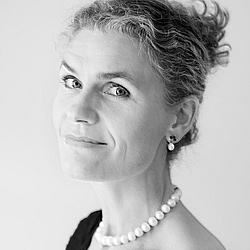A FRAYED OPUS FOR STRINGS
and wind instruments
and a lit bicycle shed
in the backyard; all that desire
constrained in shuddering
apartment blocks from where
my mind wanders
on daylong steep mountain paths
only to curl up
against your sleeping back
on a bespoken globe.
Notes on the Poem
Ulrikka S. Gernes' thoughts about how essential and fundamental poetry is informs her work. Let's take a look at those thoughts and let's apply them to the eponymous poem from the collection A Frayed Opus for Strings & Wind Instruments, originally composed in Danish by Gernes, translated into English by Canadian poet/translators Per Brask and Patrick Friesen. You don't regularly see afterwords in poetry collections, but Gernes offers one in this work, which gives a splendid view into her poetic philosophies as well as insights into her unique collaboration with Brask and Friesen. Subtitled "Notes on a Collection of Poems Considered at a Distance", the afterword opens with observations that pretty literally speak to how vital poetry is to Gernes: “I write poetry for roughly the same reason that I donate blood. I want to give something of myself back to life - as a thank you! Blood is anonymous; letters of the alphabet are, too. I hope my poems are, as well; that is, I hope they are open forms that the reader can find some of his or her own life in, that she or he can settle into them and not feel like a stranger, but like someone long awaited, welcomed and recognized, and be given something useful - new thoughts, diversion, distraction, reflection.” In its succinct lines and simply stated images, "A Frayed Opus for Strings" does offer readers a way to settle in, find things with which to relate and feel comfortable with the poem. With a final image that is both intimate and universal, readers can indeed feel welcomed and recognized, and in the poem's afterglow, can spin into mind-opening reflection. Don't you agree?
